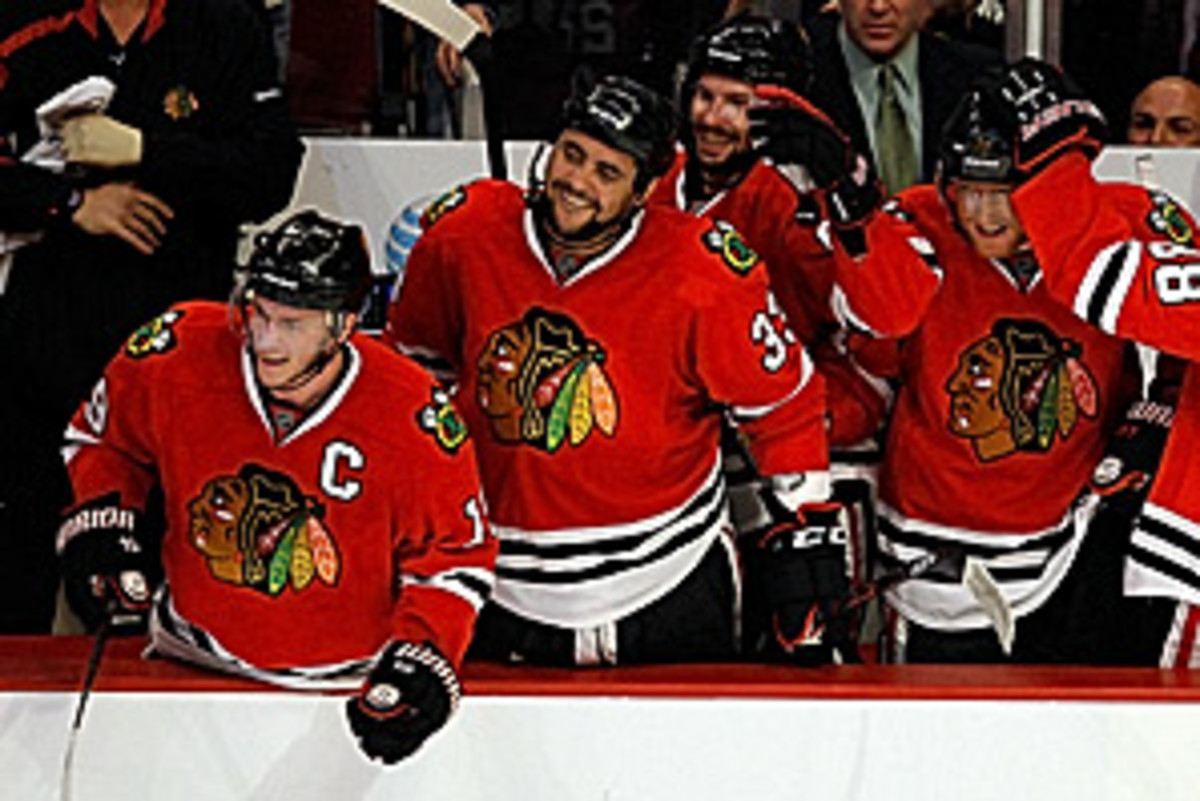
At last, the Blackhawks have become a model franchise
To say the locals have waited a long time for a team of this caliber is an understatement. The Blackhawks haven't really been relevant since the mid-nineties, and all those fans who went into hiding are back in full force.
The Blackhawks' renaissance is intriguing to me, though, from a forward-thinking standpoint. They have combined several elements -- both on the business side and on the ice -- to build a model franchise for today's NHL game. Maybe it was the classic case of a perfect storm -- a young, upcoming marketable team with a change in management personnel and philosophy -- but the Blackhawks' regime acted swiftly. It did more, rather than less, increasing television and ancillary programming, improving community visibility and interaction and upping the output and focus from an-in-house public relations standpoint.
The organization didn't wait to let the team sell itself all by itself. From top-to-bottom, the Blackhawks set best-in-class practices in motion, matching the development of a quickly improving team. Theirs was an all-in business plan that pushed the "spend money to make money" maxim although simply committing cash is never a guarantee of success. But aggressively getting out in front of their product with a sense of purpose has made all the difference and it will reap benefits for years to come.
Have the Blackhawks made mistakes? Sure, but not many. Will they have to remake their roster next season due to cap considerations? Yes, but so will every other team at some level, whether the cause is free agency, budget, or lack of performance. In today's game, though, the Blackhawks have crafted a roster that makes complete sense. From coaching to core players to style of play to positional emphasis, they have hit the right note. They may not have invented the on-ice formula -- much of that credit goes to the Detroit Red Wings -- but the Blackhawks have refined it at the right time.
Consider:
In Joel Quenneville, the Blackhawks have an experienced coach who is equal part new age and old school. He relates to the NHL game and today's team dynamics with equal aplomb. With the fluid nature of rosters today, insightful stability behind the bench is a must more than ever before.
In identifying their core group of Jonathan Toews, Patrick Kane and Duncan Keith there is a nod to the twenty-something phenomenon in today's NHL. Keeping an aging, veteran roster together is no longer possible under the cap system, so making sure young players are both able to perform and lead at a younger age is essential. The Blackhawks have all the base ingredients for long-term success led by the amazingly mature 22-year-old captain Toews.
Placing emphasis on a puck-moving, mobile defense led by Keith, Brent Seabrook, Brian Campbell and Niklas Hjalmarsson is exactly what is needed in today's game: move the puck, move your feet, defend with quickness and abet the attack with swift skating. Certainly, that element has served the Red Wings well for 15 years and the current group in Chicago ensures competitiveness long-term.
The Blackhawks didn't believe the other Red Wings' postulate to never overpay for goaltending. One of their errors was to commit over $5.6 million a year to Cristobal Huet in a free agency signing that partly cost former GM Dale Tallon his job. Huet is on the bench watching the consistent, bargain-basement puck-stopping of rookie Antti Niemi. The days of the goaltender as the focal point of a team's payroll are over. Build a better team beginning on the blueline, find a capable netminder who doesn't need to win games, just not lose them, and success is possible.
Finally, creativity in surrounding the core group is essential and something the Blackhawks have done exceptionally well. They have size in Dustin Byfuglien and Troy Brouwer through late-round drafting -- and those players are not just big for the sake of girth. They are guys with game. Mix in a proven winner like John Madden for veteran presence and sprinkle in a marquee free agent (Marian Hossa) and a supporting group -- Patrick Sharp, Kris Versteeg and David Bolland -- that can check and score, and you have a team perfectly balanced and poised to win a Stanley Cup in Chicago for the first time in 49 years.
No, they can't keep all those players next year. That doesn't matter now, and when some of the faces and names change come October, it won't matter too much then, either. The Blackhawks from top to bottom are on a roll and will continue in the Western Conference for a long time.
It has been a long time coming, but the Blackhawks finally have it right.




